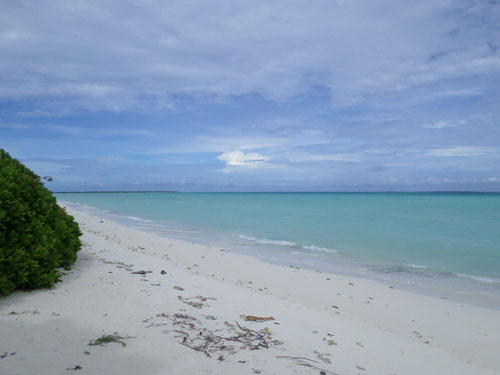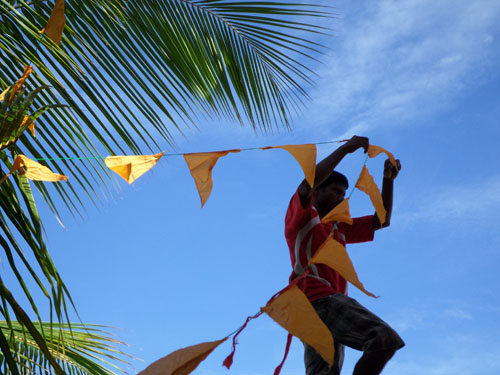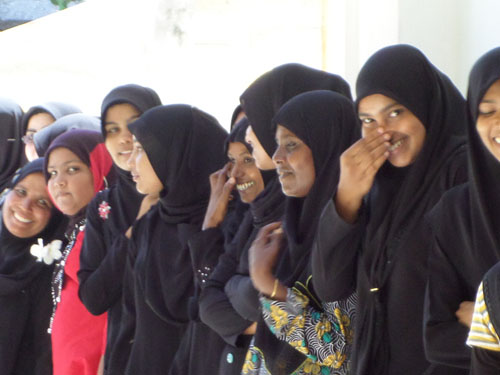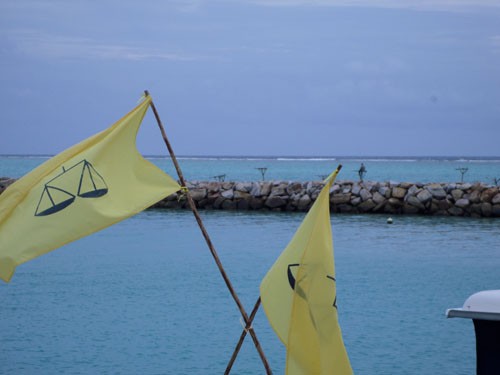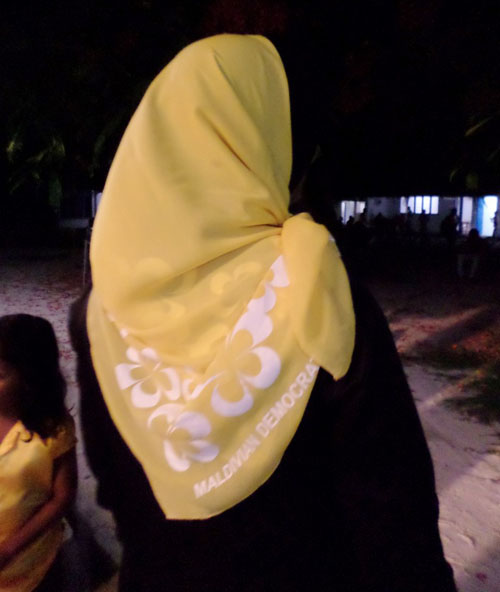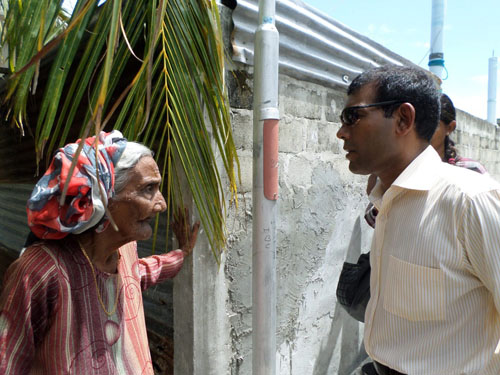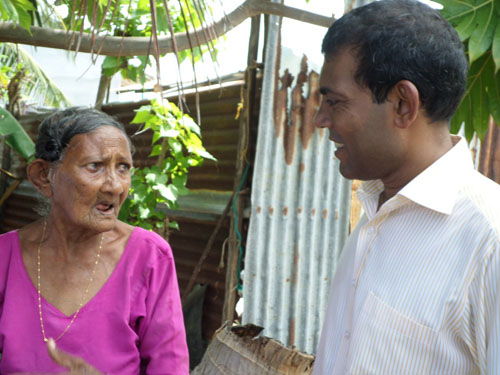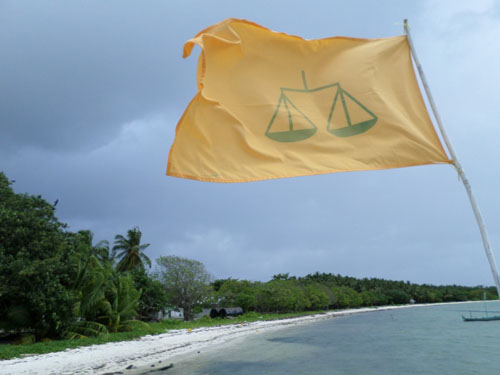There are a record number of eligible voters to persuade: 240,302, to be exact, including over 30,000 additional voters since the first ever democratic elections in 2008.
There is little time left, and much to play for. None of the parties have officially launched their campaigns yet but several candidates – incumbent Mohamed Waheed and tourism tycoon Gasim Ibrahim, most notably – have been travelling the country ahead of the official campaign. The MDP, however, is the only party so far with a clear manifesto, a campaign strategy, and an open-door policy towards the media.
MDP’s initial plan was to take in all atolls in the country in what was called the Vaudhuge Dhathuru (Journey of Promise). March and April were turbulent times with the ‘Opposition Coalition’ doggedly pursuing the aim of putting Nasheed behind bars.
Vaudhuge Dhathuru was suspended, and in its place emerged Dheythin Fahethi (Five From Three) – mostly weekend visits scheduled around the erratic court orders to arrest Nasheed. The move of DRP MP Speaker Abdulla Shahidh to MDP in April, despite his role in the events of 7 February, gave MDP’s travels across the country a new boost and a new name: Eh Burun (In One Round).
In fact, MDP’s elections campaign began unofficially almost as soon it became clear it was the only option left for restoring democracy after the authoritarian reversal of 7 February. In December 2011 came its nationwide Door to Door strategy. Initially conceived of as arecruitment campaign to get ‘every existing member to recruit one more member’, it has now become one of the MDP campaign’s chief strategies.
It has also been a highly rewarding exercise for the party, with 125,000 people already indicating it will vote MDP in September. The pledged 125,000 votes are ‘no folklore’, the MDP has said. They are votes that members have actually pledged during its Door to Door visits to tens of thousands of households.
In a country yet to be introduced to the science of polling or ways to measure approval ratings of candidates, the Door to Door strategy has provided MDP with a wealth of information about potential voters. Currently there are almost a 1000 volunteers across the country, visiting households in every island of every atoll and every area in Male’, discussing MDP manifesto, individual policies, and gauging people’s political attitudes, affiliations and needs.
According to the official party line, this is also the information on which MDP has based the four main policy pledges it has made: the beginning of an agri-business; guesthouses in inhabited islands putting tourism industry wealth within reach of all locals for the first time; mariculture business; and the empowered worker initiative.
Part of MDP’s strategy has been to make each policy launch a colourful event hosted at a different island each time. All atolls participate by releasing it simultaneously in their areas. Each policy is presented in attractive packaging depicting utopian visions of MDP’s ‘Other Maldives’ full of industrious shiny happy people.
Only one atoll, Meemu, remains on Nasheed’s list of atolls to tick-off as having visited since the unofficial campaign began. Nasheed keeps a gruelling schedule, out in the atolls on average 15 days a month, three islands each day, 45 islands each month.
I joined Nasheed’s trip to Haa Alif and Haa Dhaal from 19-21 May to launch MDP’s Agri-Business policy as part of the accompanying media. Continue reading for a behind the scenes, island-by-island (page by page) look at Nasheed’s trips to Hanimaadhoo, Kulhudhuffushi, Kelaa, Filladhoo and Baarah.
Hanimaadhoo
We arrive at Hanimaadho International Airport around 8:30am. The Maldives is experiencing seasonal rains, made especially heavy by a typhoon in the Bay of Bengal. Still, this Saturday morning, the 18 of May, the rain keeps away. The sun is watery, saturating the islands with a softer light than normal. After a night of rain, the lush green vegetation all around looks and smells freshly washed. The sea, just behind the airport’s little coffee shop, is a calm, quiet blue.

After breakfast under a Nika tree with branches that spread wide, we are driven to, Faalsaage, a guesthouse run by Dhonthu (Ibrahim Abu Bakuru) and his wife Ameena, a Male’ couple in their sixties.
Ameena and Dhonthu are typical of a group of core MDP members and activists willing to spend all their available time and energy on securing a win for the party. Dhonthu and Ameena travelled to Hanimaadho the day before Nasheed so they could prepare the guesthouse for the campaign team. MDP bears the cost of renting the rooms and feeding its team, but the rest of what is involved in ensuring the team has a place to call a base during their time in Hanimaadhoo is all effort Ameena and Dhonthu expends willingly, without charge, for the party’s success.
The presence of such people across various atolls of the country, and the successful and strategic exploitation of that rich resource, has emerged as one of the MDP campaign’s core strengths.

At Ameena and Dhonthu’s place there are about a dozen or so men busy festooning the house and its neighbour opposite with yellow MDP flags.
A woman wearing a hijab with only her eyes uncovered is standing under a palm-umbrella weaving a frangipani garland to present Nasheed with. Some men are trying to set up a temporary shelter of sea-blue canvas to provide shade during lunch.
Nasheed is due to arrive in about two hours, and there’s a feast being prepared here and in several kitchens across the island. Ameena is in charge of gathering it all in one place and serving it up. About twenty or so women have volunteered to cook – the plan is to prepare the dishes at home in their own time, and bring them over to Ameena’s for lunch.
As far as the official business of the campaign goes, Shifa Mohamed, Minister of Education in Nasheed’s cabinet, is in charge. The MDP campaign has divided the atolls into seven regions, with one designated head in charge of co-ordinating all efforts in a deignated region. Shifa is the head of the Northern Provices, and area containing the atolls of Haa Alif, Haa Dhaal and Shaviyani.
It is very easy to take to Shifa. She works without pretensions or fuss, and has an easy way with people. Having spent several weeks visiting houses in the area and co-ordinating Door to Door, ‘Shifa Madam’ is familiar to the people. On several occasions, women open up to her, voluntarily speaking of family woes and social troubles without reservation. Shifa is a good listener.
In the garden of Faalsaage, a wheelbarrow full of coconuts appears. One of the men shaves and cut the tips off the young kurumba to serve as a welcome drink when Nasheed and his team arrive. A woman sits at the corner of a table in the garden, frangipani garland in hand. She will be the one putting it around Nasheed’s neck when he comes.
To her right is another smaller table on which now stands a cake. ‘Happy Birthday, our hero,’ says the green and yellow cake. Two women stand near, swatting away flies with the intention of landing on their creation. One of the women is the same one in a hijab I noticed earlier.
“It was Nasheed’s birthday yesterday,” she tells me. There is excitement in her eyes, the only part of her I can see.
“He is our hero,” she repeats what they have already said in confectionary. With only eyes as a guide, I guess her to be anywhere between fifty and sixty years of age. A group of women collected MVR 20 (US$1.30) each, bought the ingredients, baked and decorated the cake, she tells me.
By noon, the steady trickle of women turn into a stream. Having cooked and delivered the food, all the women have returned in their best dresses to greet Nasheed. Almost all are wearing black from head to toe.
It is an astounding change from about a decade ago, when any gathering of Maldivian women would have brought together every colour of fabric under the sun. Today, the only relief from the monotone of black are bolts of canary yellow—women accessorising with yellow burugaas or children dressed in yellow.
When Nasheed arrives there’s close to a hundred women at the guesthouse. There are also about half that amount of men.

Nasheed shakes hands with them all, chats to people over his drink of fresh coconut, cuts the cake to the obvious delight of the women, and disappears upstairs with Shifa, a group of councillors and Hanimaadhoo’s resident campaign team. They will discuss the area’s Door to Door strategies.
Lunch is the feast that it promised to be. There is garudhiya, kulhimas, roshi, all sorts of mas-huni, faiy riha…a whole range of Maldivian dishes that taste as delightful as only island-home-cooked Maldivian dishes can taste.
As Nasheed rests, prays and strategises, I spend the time chatting to some women who still linger. They are waiting to say goodbye when Nasheed leaves for Kulhudhuffushi in a short while.
It is easy to chat with the women. Despite their attire, and the appearance of conservative religiosity, the women were as mischievous and their banter as full of flirtatious double-meanings as women in the region were famed for before Islamists began exercising control over the conduct of their daily lives and faith.
I learn from the women that this part of the island, closer to the airport, is where the people of Hon’daidhoo settled when they were relocated after the 2004 Tsunami wrecked their island. ‘The indigenous people of Hanimaadhoo live over on the other side,’ one of the women tell me.
Most of them, says Mariyam Nazima (35), are also on ‘the other side’ politically—that being supporters of PPM and Gayoom loyalists.
The women are eager to gossip. They tell me Waheed and Ilham have a holiday home on Hanimaadhoo and visited recently. ‘Waheed made it seem like he’s from the island,’ Nazima laughs. ‘But we knew they got land during an earlier decentralisation plan.”
I ask why they like Nasheed. “He’s like one of us. He treats us like equals,” she says. Other women on the jolis beside us agree. “He visits all the houses, rich and poor alike.”
On all islands that I visit with the MDP campaign team, this is what supporters point to as the reason they like Nasheed most: ‘he is one of us’.
Kulhudhuffushi

We arrive in Kulhudhuffushi at about 3:30pm in the afternoon by speedboat from Hanimaadhoo. People line the harbour area to welcome Nasheed. Here there are more men than there were in Hanimaadhoo, but the women still out number them by far. Nasheed will launch the Agri-Business policy at the school hall in Kulhudhuffushi in about half an hour. Close to 200 people attend.
The MDP’s Agri-Viyafari policy is ambitious. The plan is for the government to lease plots of land on various inhabited islands in each atoll, along with equipment, seeds, fertilisers and labourers to anyone interested in setting up a farm. The government will operate a mobile shop, a vessel called Fresh-Isles, which will be perpetually travelling to the islands and buying their produce.
“This way, all farmers will always be guaranteed a market,” Nasheed pledges.
Transporting local products to Male’ and other relatively large markets from their own islands is one of the biggest problems Maldivian farmers encounter today, Nasheed says.
This is a week in which such statements hit home. Newspapers are full of reports lamenting hundreds of thousands of lovely ripe mangoes from Fuammulaku that went rotten for lack of transport in the unusually rough weather. MDP’s AgriBusiness policy means a reduction in such losses.
“Farming should put Rufiya in the pocket, not just food on the table. It’s not about having enough muran’ga leaves to put in your omelette in the morning.” Over the course of the trip Nasheed warms to the muran’ga analogy and repeats it on different islands.
Currently the Maldives imports MVR 245 million (US$18.8 million) worth of agricultural products a year. AgriBusiness aims to slash the amount down to MVR 108 million (US$7 million), Nasheed tells Kulhudhuffushi.
“If we are going to reduce the amount of products we import, then we must increase the duty for those products” ensuring an attractive price for local products.
With plots of land, seeds, equipment and labour readily available for farmers to hire from the government, Nasheed says the AgriBusiness policy would increase national productivity by 1.7 percent. MDP will ensure the creation of at least a thousand agricultural experts in the country and will create 2500 new jobs for implementation of the policy alone.
Nasheed tells the people of Kulhudhuffushi that his government would have the farms and markets up and running within two and a half years. What MDP wants, Nasheed says, is the empowerment of people through their own industry, in public-private partnerships that opens up the country to the globalised market place, and puts money in all local pockets.
As Nasheed’s campaign has progressed, the gist of his speeches at policy launches has been this: Maldivians deserve better than their current hand-to-mouth existence. If people only stop to think about it, the Maldives has rich resources that can make the entire society wealthy rather than a handful of individuals filthy rich. People must reject habits of patronage ingrained in the ‘Maumoonism’ of the last 30-years and vote for an MDP government to, instead, work for a better life for themselves.
Agri-Business offers attractive prospects, and Nasheed is on top form in Kulhudhuffushi, bristling with energy and enthusiasm. Yet, the reaction among the crowd is somewhat muted. Nobody asks any questions when he opens up the floor. There’s applause at some points during the speech, but there is very little spontaneity among the audience.
“Kulhudhuffushi is always a difficult island. People are peculiar,” a campaign team member observes later, when I ask about the muted reaction. What ‘peculiar’ means is not defined by any of the several people who gives me the same response about the people of Kulhudhuffushi—‘eiee varah faadegge baeh’ [they are a very peculiar people].
A more likely explanation is the turbulent politics in the island’s recent history. On 8 February, when the police cracked-down brutally on MDP supporters in Male’, Kulhudhuffushi is one of several islands where people reacted with violence. There was an arson attack on the police station, and a further two incidents of unrest since. When Nasheed visited the island on 27 February 2012, tensions between MDP and PPM supporters broke out into direct confrontations.
At the moment, 28 MDP members (including two councillors) from the island currently stand accused of various charges ranging from terrorism to obstruction of justice. Eleven hearings were held on May 19, the day after Nasheed visited Kulhudhuffushi.
Kelaa

Kelaa is stunningly beautiful. It has long wide roads lined with lush vegetation, and beautiful houses on large plots of land with lovingly tended gardens rich with tropical flowers and fruits. There are several hundred more people gathered at the harbour as the sun sets to welcome Nasheed to Kelaa. The Kelaa crowd is the biggest, and the most unreservedly welcoming so far. In what I can identify as a pattern at this stage, men out-number women. Here, the gender gap is much smaller, though.
In Kelaa, there’s dinner, followed by a campaign speech by Nasheed at the main school hall at 9:30 pm. This rally is apart of Eh Burun (In One Round) segment of Nasheed’s campaign.
There’s excitement in the air. Kelaa supporters of MDP are enthusiastic and passionate about winning the elections. The councillor, Haulath Mahira, is on fire. She loudly denounces policies of the previous government, condemns the February 7 coup, and rallies the crowd to vote for Nasheed.
“We must not let ourselves be dragged back to those days,” she screams into the microphone. The crowd erupts into applause.
Kelaa welcomes the Agri-Business policy with loud hoots, cheers and claps. They are enthusiastic about the prospects and the potential it has for making their farming businesses more successful. The people of Kelaa are already committed farmers.
“We’ll buy everything. Everything,” Nasheed tells them to loud applause. He argues for public-private ownerships that opens the island up to numerous opportunities in the globalised world. Like in Kulhudhuffushi, he talks about forming partnerships with fast developing countries in the region and the rest of the world, and argues against protective nationalism and isolationism.
“We have been too hung up on ownership. Whether our partner in business is foreign or not, Kelaa will always belong to the people of Kelaa.”
Nasheed’s supporters lap up his digs at the opposition’s isolationist approach that has alienated several foreign investors during the last year. This is what the opposition media coverage of Nasheed’s campaign focuses on the next day.

There’s bon’dibaiy after the hugely invigorating rally. I notice a woman wearing a yellowburugaa that has Maldivian Democratic Party printed on it. I wonder if it is unique, this new Maldivian habit of making their Islamic headgear also a political statement.
One woman from Filladhoo told me that there is a brigade of women on the island who support anyone but Nasheed. They change the colour of their burugaa according to party colours of whichever non-Nasheed candidate is visiting the island. Blue for Thasmeen, Pink for Gayoom Yameen, and so on. Talk about a mish-mesh of religion and politics.
We are leaving after breakfast, scheduled for 8:30am. I wake up early and use the time to catch up with an old Kelaa friend, a 44-year-old mother of four, and explore the island a bit. Kelaa is clearly more prosperous than other islands in the atoll.
The houses are large, well-built and modern. Several, however, are empty. Many families are forced to leave their life on the island for Male’ once their children near the end of their secondary school years.
“If we stay, what will happen to my daughter?” Shadiya asks me.
Shadiya, in her forties, lives in a beautiful house, painted completely yellow and boasting all mod-cons of modern luxury with her two daughters. Her husband works on a resort island near Male’, and can only visit occasionally.
Their older daughter is sitting GCE O’Level exams this year. “I want her to get an education, so we must go.” Reluctant to send their children to Male’ on their own for higher eduction, all parents who can afford it leave their comfortable houses for a cramped and difficult life in the city so their children can get the education necessary for university.
It is a sad sight to see, all the lovely houses in Kelaa standing empty and lifeless.
Along the way, we meet my friend’s 8 year-old mother-in-law. She is hobbling slowly with the help of a walking stick. Her mood seems despondent.
“I wanted to go to the harbour to greet Nasheed, but my bad knees won’t let me walk that far,” she explains. “I don’t know if I will live long enough to see him again.”
I have run into an elderly fan of Nasheed. Over the course of the day, I run into many more. Over 65s, I find out, are one of Nasheed’s core support groups.
Breakfast is at the Kelaa MDP Haruge. Yet another feast of Maldivian food prepared by women supporters who had stayed up the night to ensure everything on their candidate’s plate this morning is fresh. There is roshi, mashuni, kulhimas, sweet black tea and various kinds of curry. About twenty women are busy serving, exchanging easy banter, and glowing from the excitement of meeting Nasheed. “He is one of us,” they tell me.
Perhaps this excitement and adoration that Nasheed seems to evoke in his supporters is what incites the opposition’s frequent accusation that MDP is a cult led by Nasheed.
Filladhoo

Filladhoo is a small island with a population just over a thousand. On arrival, like on other islands, there’s coconuts waiting, and the news that forty people had signed for MDP overnight. Twelve of them were waiting to sign their membership forms in front of Nasheed.
Later he holds a policy meeting in the cramped living room of a small house—unlike Kelaa or Hanimaadhoo, there is no dedicated campaign headquarters for the team on this less well-off island.
Just as in Hanimaadhoo, here too, Nasheed’s voice carries loud and clear outside the room onto the street where we wait. The first stop in the door-to-door round of the afternoon is a house owned by an MDP family like Ameena and Dhonthu’s.
The woman of the house, Shaheedha Ismail, 50, has prepared a snack of aveli [an old Maldivian dish] for the team. Nasheed takes gamely to mixing the aveli and chatting to MDP members Shaheedha has invited to join.
One wall of the entire living room is filled with pictures of Shaheedha’s seven children at their respective weddings. Shaheedha, too, is an ardent fan of Nasheed and makes it a point to tell me that she always opens her doors for any activity that will benefit the party.
Why does she like Nasheed so much? “I want someone who lives like us,” Shaheedha says. “He has been very good to my parents.”
During the door to door visits, Nasheed catches up on the fate of a sick child, listens with concern to a woman’s worries about the treatment of her child at school, and is delighted to meet a woman cutting muran’ga leaves.

“This is a picture I want,” Nasheed says. “This is what I have been talking about – when our Agri-Business policy gets going, farming won’t be just about having enough muran’ga to put in your omelette.” There’s childish glee on his face to have come across what he sees as the actualisation of a picture he had earlier created with his words.
In one house Shifa listens to a woman tell her about a 35-year-old daughter with special needs that the State refuses to recognise as being in need of state benefits.
I learn that Filladhoo has been without a doctor, or even a community health worker for over three months. “The Health Ministry says it will send a doctor when it can,” she tells me. There is no knowing when that will be.
What happens in case of emergency?
One of the MDP volunteers tells me there were two emergencies in the last month – a school boy broke his arm and a man fell off a coconut tree breaking his leg. Both had to be taken to Kulhudhuffushi, all costs born by the patients and their families.
Previously, the people of Filladhoo could take a ferry to the island of Dhiddhoo for Rf20. Dhiddhoo has a hospital. But the ferries have been discontinued since the coup and anyone in Filladhoo unfortunate enough to suffer an illness or injury must hire a Dhoni for over 2000 Rufiyaa to take them to Kulhudhuffushi.
“Filladhoo’s pregnant women now travel to Kulhudhuffushi in their eighth month – with no doctor on the island, none of the women want to risk labour complications. Most have to stay in rented accommodation, accumulating huge expenses families find hard to bear”.
On the road back to the jetty, we meet a woman well in her eighties who cannot recall her exact age.

She is out on the street, holding her daughter’s hand to steady herself, on the off-chance of running into Nasheed. Nasheed chats to her easily, and tries to calculate her age from her earliest memories. She remembers Hassan Fareed very clearly, she says. Nasheed calculates her age to be roughly around eighty-five.
He’s still muttering about Hassan Fareed when he runs into another woman of about the same age. She, too, is lingering on a side street on the off-chance of running into Nasheed.

Before we get to the jetty, we meet a third woman in the same age group, waiting in a lane-way, alone.
“She has a tough time, that Dhaththa [older sister, generic term used for older women],” an MDP councillor explained. Her children do not want her supporting Nasheed.
Intimidation by children who do not want their elderly parents to support MDP or vote for Nasheed is a trend common to several of the islands. The women I talked to in Hanimaadhoo recounted several such stories, as did the ones in Filladhoo.
Some grown-up children, I learn, also confiscate their parents’ ID cards and bank cards, keeping the parent a virtual prisoner both politically and financially.
Baarah

The island of Baarah is shaped like a C, with the jetty right at the centre. On both sides is turquoise blue sea and a long white strip of beach lined with tall coconut palms and other large tropical trees. It is the island where national hero Boduthakurufaanu met his wife, and the island of Ramlah, the winner of the first Maldivian beauty pageant held back in the glory days of Mohamed Amin Didi.
Lunch is at a small restaurant attached to a house which opened its doors for MDP on Baarah. There is the usual splendid array of Maldivian food—rihaakuru garudhiya, bambukeyo lee baiy,lonu mirus, even kan’doo from the kulhi with fresh grated coconut and grilled reef fish.
Over a dozen women move in and out of the restaurant area. Like on other islands, they have pooled their efforts to cook up the feast.
The men of Baarah are also surprisingly hands-on in serving food and overseeing lunch. We meet a most interesting man as we linger over the meal. Moosa Bey (Moosa Ibrahim) is a 75-year-old man who bursts into loud uncontrollable tears suddenly and without warning.
“I have a very big and very soft heart,” he tells us before beginning to cry loudly. It takes a few of us media people a good half hour of trying to console Moosa Bey to realise what the whole island already knows: Moosa Bey likes to act.
Still, he is a very likeable man, and we visit his house to meet his wife Faathuma. En route, he flirts with the twenty-something year old volunteer who joined us from Kulhudhuffushi. He wants his picture taken with her.

Moosa Bey proudly claims that his house, almost complete now, is being built with the MVR 2000 (US$129) benefit for the elderly that he and his wife receives from the government every month. Moosa Bey’s house is modest, and there is no furniture just yet.

Walking around, I notice people here are even more polarised than on all the other islands we have been to. Non-MDP supporters are openly hostile, even to us ‘media people’ walking around with neither Nasheed nor any member of the MDP campaign team anywhere in sight. They refuse to smile or greet us, choosing instead to look on glumly, staring daggers.
It is sad to see traditional Maldivian hospitality vanishing in the strong emotions of partisan politics. I meet a twenty-something year old woman who is not an MDP supporter but is willing to talk. Only because she has a friend among the media.
I learn that on Baarah the PPM and/or ‘opposition coalition’ supporters are more forceful in intimidating MDP supporters than the men I heard about on other islands. “MDP members hired a woman’s Bodu Beru group to welcome Nasheed.
The group is composed mostly of members of DRP and supporters of Gayoom. The women were willing to play for money, though, Nasheed or not. But the men intimidated them into pulling out at the last minute. “They were going around making all kinds of threats,” she tells me.
It is around 4:00 p.m now and the trip is coming to an end. Nasheed leaves for Male’ at 7:30 pm and we need to be in Hanimaadhoo airport by 5:00. At the jetty, a fishing boat has docked. Women gather to buy the catch. One by one, they come back with varying amounts of fresh fish which they will cook at nightfall.
Nasheed will leave for Noonu Atoll tomorrow.
Dr Azra Naseem has a PhD in international relations
For more photos of the trip, visit Dhivehi Sitee Facebook Page
 “We’re doing this for democracy. We don’t want any money or incentives for this. All we want is an elected government that cares about the people”, one group of young graffiti artists painting Maldivian Democratic Party (MDP) themed artwork in their neighbourhood told Minivan News.
“We’re doing this for democracy. We don’t want any money or incentives for this. All we want is an elected government that cares about the people”, one group of young graffiti artists painting Maldivian Democratic Party (MDP) themed artwork in their neighbourhood told Minivan News.
 she supports him “with heart and soul”.
she supports him “with heart and soul”.
 up is a job done for about MVR 10,000 (US$650). We’re economizing the situation when there is a demand for skills like ours. Nothing wrong with that, eh?”
up is a job done for about MVR 10,000 (US$650). We’re economizing the situation when there is a demand for skills like ours. Nothing wrong with that, eh?”



